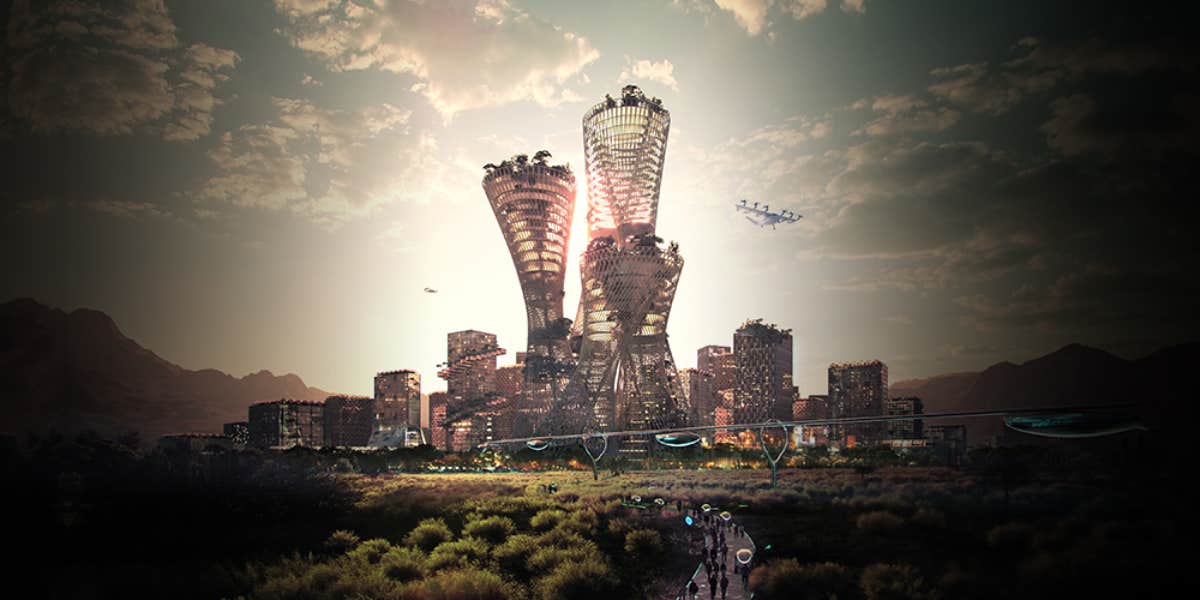Ex-Walmart Exec Plans To Build City With Equal Access To Healthcare & Education — But You Must Apply To Live There
This actually looks like a good idea.
 Twitter
Twitter Marc Lore was the head of Walmart eCommerce US before leaving earlier this year in order to chase his dreams of building a new city.
From the ground up, Lore plans to build a new city, called Telosa, in which citizens can “take advantage of our new way of life” and “live in a vibrant, exciting, sustainable city that is forging a blueprint for the future.”
What is Telosa?
Marc Lore believes his new city, Telosa, will represent the culmination of U.S. society.
Before embarking on this brand-new, ambitious endeavor, Lore became a billionaire by starting two e-commerce startups and selling them for $550 million and $3.3 billion.
While his other billionaire buddies decide to race in space, Lore wants to stay on the ground — where he’ll build a futuristic city from scratch in hopes to reinvent the way humans live.
The city of Telosa will be built upon the concept of “equitism,” a mashup of equity and capitalism “in which citizens have a stake in the city’s land — as the city does better, the residents do better.”
Capitalism — the same system that brought us the 1% and wealth inequality that means that the same 1% make 16 times more money than the bottom 50%.
Lore wants a new form of capitalism with more equality.
While it’s quite the tall order, it seems that Lore actually has it covered.
On his website, he includes that the concept will “support businesses and organizations in developing policies and protocols to create opportunity and close equity gaps.”
The biggest attraction to the city’s base plan is the way that land will be owned and maintained.
So this land that people can build on, sell, and make money off of, would still be owned by the city in question.
The idea is that the money made will be put back into the city and help fund other social services — kind of like how taxes should work.
“A new city built from scratch avoids the legacy issues of infrastructure and policies that constrain and restrict what can be developed,” according to the FAQ page on the Telosa website.
Another selling point to the city of Telosa is how inclusive all of it will be. People of all incomes, races, and backgrounds will be allowed to live in the city.
Citizens will have equal access health care, excellent schooling, and safe environments for families.
“We are building Telosa of, by and for the people,” Lore states, “which requires input from people of every walk of life, every level of income, every racial and ethnic group and every political perspective.”
However, Rome wasn’t built overnight. No matter how grand the idea is, the foundation needs to be solid and well thought out in order to succeed.
According to the website, the city has a 40-year plan of growth, where the initial phase of Telosa will begin in 2030 when citizens will be allowed to move in.
The initial phase was estimated to cost over $25 billion — $400 billion for expansion — and will consist of 1500 acres of land where 50,000 people will settle.
Within 40 years, he wants the city to span 150,000 acres and be home to 5 million people. To put that into perspective, New York City is home to 8.4 million and Los Angeles houses nearly 4 million.
Lore hasn't decided where Telosa will be located.
Right now, Lore is focused on building his team, refining the vision, and determining the location for Telosa — which he believes will be one of the two major challenges.
“There are real challenges with finding the right location,” he admits, “water, climate, logistics, and other features but the greatest challenge based on other new city projects, will likely be to generate public and political support.”
While there are several locations that are currently being scouted — including Texas and the Appalachian region — Lore is tight-lipped about partners and potential investors who will help fund the city.
Even though it currently feels like a pipe dream, the concept itself seems really intent on keeping the city open, inclusive, and caring for the needs of the people.
Applications to join Junto — the team created to back the project — are open on the website and ask you to submit your ideas in order to be considered.
Isaac Serna-Diez is a writer who focuses on entertainment and news, social justice, and politics. Follow him on Twitter here.
